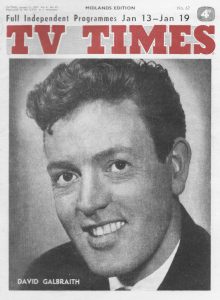From the TVTimes Midlands edition for 13-19 January 1957
 When Boris Ford was appointed Head of School Broadcasting for Associated-Rediffusion, he said he hoped people wouldn’t call him “Headmaster.” He hoped in vain. Already he’s known throughout the country, months before the programmes start, as “The ITV Head.”
When Boris Ford was appointed Head of School Broadcasting for Associated-Rediffusion, he said he hoped people wouldn’t call him “Headmaster.” He hoped in vain. Already he’s known throughout the country, months before the programmes start, as “The ITV Head.”
But for these school broadcasts, which ITV is pioneering in Britain, Mr. Ford intends to stay pretty much in the background — as far as the viewer is concerned. He may introduce the first scries at the end of April, but probably won’t be seen often during the lessons.
He will have a staff of ten to prepare the programmes, and the benefit of an advisory council comprised of educationalists. The actual TV production will be handled by TV experts: Rosemary Horstmann, former Manager of Women’s Programmes, has been appointed Manager of School Broadcasting.
The programmes will be mainly directed at the 14 to 15-year-olds, 75 per cent of whom are at secondary modern schools. Transmission times are not yet fixed definitely, but may be 1.45 to 2.15 — every day from Monday to Friday in term time.
Lively
 Mr. Ford, 39-years-old, married, and with four children, says: “Education need not be solemn to succeed. I hope our programmes will be extremely lively and invigorating.”
Mr. Ford, 39-years-old, married, and with four children, says: “Education need not be solemn to succeed. I hope our programmes will be extremely lively and invigorating.”
In that case, I imagine he will find himself entertaining not only schoolchildren — but housewives. He agrees that the programmes may well have quite a large “eavesdropping” audience.
TV lessons, says Mr. Ford, will not attempt to oust the teacher or the printed word, but to supplement them. Programmes may deal with civic affairs, historical geography, and even the launching of the earth’s man-made satellites.
Ex-soldier
Mr. Ford is a Cambridge M.A., and during the war served with army education – finishing as Chief Editor at GHQ in Cairo. In post-war years he held important posts with the Bureau of Current Affairs and was Information Officer and Editor to the Technical Assistance Board of the United Nations Organisation.
In 1953 and 1954 he was Secretary to the committee for inquiry into vocational and non-vocational further education, and in 1955 was appointed Editor of The Journal of Education and Universities Quarterly. Last year he became organising secretary of a trust body named Children’s Play Activities Ltd.
£2,000 a week
Captain T. M. Brownrigg, general manager of Associated-Rediffusion, says the programmes will cost the ITV companies, together, about £1,500 to £2,000 a week. That’s not a lot as TV costs go: but Capt. Brownrigg reminded me — “A lot of the cost of TV programmes goes in salaries to the stars, and teachers don’t cost as much as Arthur Askeys.”
Rosemary Horstmann, who is manager of Associated-Rediffusion’s education programmes, was connected with the BBC’s experimental schools telecasts five years, ago and has clear ideas on what TV should give young viewers. “It should be something they can’t get from teachers,” Miss Horstmann said, “Television is not an easy way out for a teacher. You must have imagination to take from the screen what you want and bend it to the needs of the class.
“TV can provide a strong stimulus. If, for example, children are studying Macbeth for GCE we might get a famous Shakespearian actor to talk about his interpretation of the part.
“And TV is a good medium for relating what is learned in the classroom to what is learned outside. If a boy goes to work in a factory he would know only his own job and the boss would be a shadowy figure. We can bring the boss on TV, and show how the whole factory operates.”
